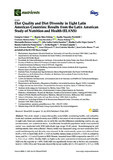Mostrar el registro sencillo del ítem
Diet Quality and Diet Diversity in Eight Latin American Countries: Results from the Latin American Study of Nutrition and Health (ELANS)
| dc.creator | Gómez Salas, Georgina | |
| dc.creator | Fisberg, Regina Mara | |
| dc.creator | Previdelli, Ágatha Nogueira | |
| dc.creator | Hermes Sales, Cristiane | |
| dc.creator | Kovalskys, Irina | |
| dc.creator | Fisberg, Mauro | |
| dc.creator | Herrera Cuenca, Marianella | |
| dc.creator | Rigotti, Attilio | |
| dc.creator | Guajardo, Viviana | |
| dc.creator | Zalcman Zimberg, Ioná | |
| dc.creator | Murillo, Ana | |
| dc.creator | Brenes Sáenz, Juan Carlos | |
| dc.creator | Cortés Sanabria, Lilia Yadira | |
| dc.creator | Yépez García, Martha Cecilia | |
| dc.creator | Pareja Torres, Rossina Gabriella | |
| dc.creator | Chinnock Mc'Neil, Anne Eliza | |
| dc.date.accessioned | 2021-10-27T17:19:05Z | |
| dc.date.available | 2021-10-27T17:19:05Z | |
| dc.date.issued | 2019-07-15 | |
| dc.identifier.citation | https://www.mdpi.com/2072-6643/11/7/1605 | |
| dc.identifier.uri | https://hdl.handle.net/10669/84837 | |
| dc.description.abstract | This study aimed to assess diet quality score (DQS), considering healthy and unhealthy foods and nutrients, and diet diversity score (DDS) as indicators of risk of noncommunicable diseases in eight Latin American countries, and to verify the possible differences considering country, sex, age socioeconomic, and nutritional status. A multicenter household population-based cross-sectional survey was conducted with 9218 individuals (age range 15–65 years). Sociodemographic and anthropometric data were collected. Dietary intake was measured using two non-consecutive 24-h recalls and diet quality and diversity were assessed. In the whole sample, scores were observed from 63.0% ± 9.3% to total DQS, 65.0% ± 13.6% to healthy dietary items and 60.2% ± 13.6% to unhealthy items, and 5.6 ± 1.1 out of 9 points to DDS. Women presented lower DDS compared to men (5.5 ± 1.1 vs. 5.6 ± 1.1, p < 0.001). Healthy DQS was higher as the socio-economic level increased, and unhealthy DQS was the opposite (p < 0.05). Total DQS was significantly lower only at the low socio-economic level (p < 0.05). Chile and Venezuela showed the lowest healthy (62.2 ± 15.2 and 61.9 ± 11.7, p < 0.05) and total DQS (61.4 ± 10.3, 61.2 ± 8.7, p < 0.05). No effects were observed when considering the age and anthropometric measurements. Promoting consumption of a diverse and high-quality diet is an essential challenge to accomplish | es_ES |
| dc.description.sponsorship | Instittuto Pensi/[]/Hospital Infantil Sabara/Brasil | es_ES |
| dc.description.sponsorship | /[]/Universidad de Costa Rica/Costa Rica | es_ES |
| dc.description.sponsorship | /[]/Pontificia Universidad Católica de Chile/Chile | es_ES |
| dc.description.sponsorship | Fundación Bengoa/[]/Universidad Central de Venezuela/Venezuela | es_ES |
| dc.description.sponsorship | /[]/Universidad San Francisco de Quito/Ecuador | es_ES |
| dc.description.sponsorship | /[]/Pontificia Universidad Javeriana de Colombia/Colombia | es_ES |
| dc.description.sponsorship | /[]/International Life Science Institute (ILISI)-Mesoamerica/Costa Rica | es_ES |
| dc.description.sponsorship | /[]/Instituto de Investigación Nutricional de Perú/Perú | es_ES |
| dc.description.sponsorship | /[]/Coca Cola Company/Estados Unidos | es_ES |
| dc.language.iso | eng | es_ES |
| dc.source | Nutrients; Vol 11 Núm 7: 2019 eLocation:1605 | es_ES |
| dc.subject | LATINOAMERICA - NUTRICIÓN - CONTROL DE CALIDAD | es_ES |
| dc.subject | LATINOAMERICA - ALIMENTACIÓN | es_ES |
| dc.subject | LATINOAMERICA - ALIMENTOS - CONTROL | es_ES |
| dc.subject | INVESTIGACIÓN CIENTÍFICA - ESTUDIO TRANSVERSAL | es_ES |
| dc.title | Diet Quality and Diet Diversity in Eight Latin American Countries: Results from the Latin American Study of Nutrition and Health (ELANS) | es_ES |
| dc.type | artículo original | |
| dc.identifier.doi | 10.3390/nu11071605 | |
| dc.description.procedence | UCR::Vicerrectoría de Investigación::Unidades de Investigación::Ciencias de la Salud::Centro de Investigación en Neurociencias (CIN) | es_ES |
| dc.description.procedence | UCR::Vicerrectoría de Investigación::Unidades de Investigación::Ciencias Sociales::Instituto de Investigaciones Psicológicas (IIP) | es_ES |
Ficheros en el ítem
Este ítem aparece en la(s) siguiente(s) colección(ones)
-
Nutrición [253]


